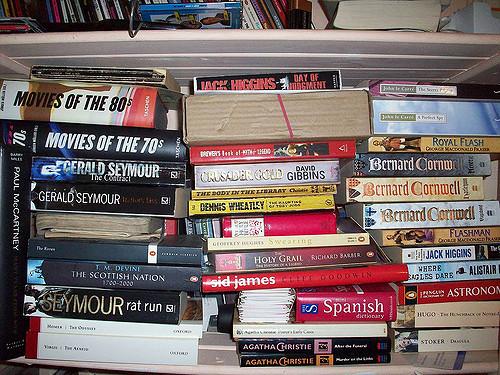 A blogger named Max Florschutz ponders “the idea that customers aren’t holding an e-book to be of similar value” and wondering why that was. Chris Meadows ably summarizes a few of Mr. Florshutz’s points, but even he concludes that a paperback price for e-books is “about right.” I beg to differ. Here’s why.
A blogger named Max Florschutz ponders “the idea that customers aren’t holding an e-book to be of similar value” and wondering why that was. Chris Meadows ably summarizes a few of Mr. Florshutz’s points, but even he concludes that a paperback price for e-books is “about right.” I beg to differ. Here’s why.
1) The physical costs of the paper infrastructure do account for something. I know, I know, they are a drop in the bucket of the book’s price. The editorial process costs much more. But still, it costs…something. I have seen it variously estimated at 5-10% of the book’s price. Not the majority of the cost, I concede. But it is a cost. And if I am forgoing the paper process, I do deserve to save a little.
2) E-books take away user rights. I took a course once with an e-book option. I was sorry I chose it. I was not allowed to cut and paste (so I had to manually type quotes from it into the course message board whenever I was citing something in my work) and it expired 10 days after the course ended. If I had spent $15 more on the paper copy, I would still be typing in my comments by hand, but at least the book would not go away.
3) E-books are not proofread as thoroughly. The most recent e-book I finished had twelve typos, and that is on the low side for an e-book. I know because I always mark them and correct them in case I want to read the book again. All of these typos were basic ones that a simple proof-read would have caught. If e-books were actually of the same quality as paper books, perhaps you’d have an argument for pricing them the same. But they are not. They are sloppy. And so they do not merit the same price.
4) Mainstream e-books are encumbered by DRM. This makes them de facto rentals. And I can’t think of any other industry that expects you to pay the same for a rental as you would for an outright purchase. You want to charge me full, retail prices? Sell me something I really own. But if you’re selling me a rental, I will expect to pay rental-level prices.
So, the solution? I think it’s an easy fix, actually. Apologize to readers for the years of shoddy proof-reading and vow to give all your e-books a once-over by a proof-reader before you put them up for sale. Have an easy, instant way to fix any errors that a user reports after the fact. This is partly a public relations issue; I have written to at least two authors who flat-out told me that the presentation of their e-books was not their problem, and one of those e-books was listing for $18. That is simply unacceptable from a customer service standpoint.
Secondly, enroll all your books in a Kindle Unlimited type of service—run by someone else if you don’t like Amazon—where people can pay a monthly fee for a fixed number of rentals. Maybe $9.99 gets me two books a month, $12.99 gets me three or whatever. I can keep the books as long as I want, but I can’t sign out a new one until I return something. This is really the only fair scenario for DRM. I am diligent about backing up my e-books, but every time a vendor has shut down or I have migrated computers, one or two books I paid for fall through the cracks. If you insist on DRM, and I don’t own the book for real, charge me rental prices, please.
Or continue selling as you are, but remove the DRM and then set up an auto-pricing system that automatically lists an e-book for 5% less than the cheapest paper edition. That will satisfy the ‘cost of paper’ objection, and it will drive sales toward the optimal versions. What you don’t want, on a site like Amazon which lists all the editions together, is for a reader to be so turned off by the high e-book price that they go for the five-cent used paperback. Offer them a fair price, and they will purchase the edition they actually wanted in the first place.
I read a lot of books, and I am willing to pay a reasonable price for my content. I don’t think it should be free. But I do think it should be reasonable. I don’t like paying full price for a book I can’t own. I don’t like paying $12 for it, and then staying up an extra hour after I’m done reading to fix all the typos so I can still enjoy it later. I don’t like feeling that I am being taken advantage of because publishers don’t value my business enough to turn out a quality book. There is no sinister conspiracy theory here. The reasons for a lower perceived value on e-books are pretty straightforward, and so, I think, are the fixes.
Photo credit: Here.


































On the comment about typos, did you compare the print and ebook editions to verify that the typos were not in the print edition? Prior to 2010, when ebook editions of a new book were not standard, the ebook created from a scan and OCR is likely to have typos not in the print edition, but I believe most new books from the major publishers are created with programs that create the print and ebook versions in the same workflow from the same text. I would expect that both editions will have the same typos.
Your comment about taking away user rights is an oddity of the college textbook world, I have never purchased a book that expired. If you want to talk about taking away user rights, the big one is the inability to give it away, sell it, or pass it to heirs after death. I think this is a tangible loss, worth up to a quarter cover price, as this is what my local used book store pays for a paperback.
I don’t think you’ll ever see ebooks priced this way because the publishers are trying to maintain a price equivalence between the print and ebook versions. Since hardcover and trade paperbacks are often discounted by retailers, the publishers are forced to price the ebook at a discount from the HC and TPB cover prices, but mass market paperbacks usually don’t get discounted, so the publishers don’t discount ebooks from the MMPB cover price.